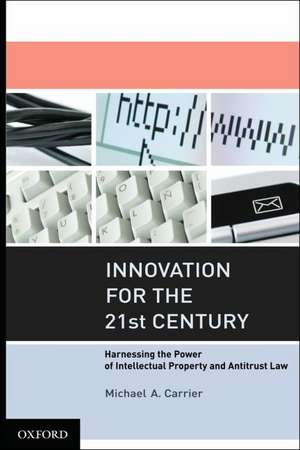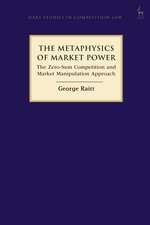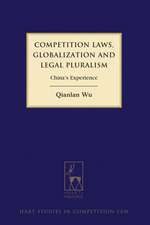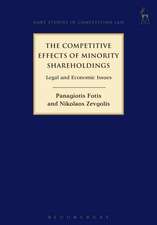Innovation for the 21st Century: Harnessing the Power of Intellectual Property and Antitrust Law
Autor Michael A. Carrieren Limba Engleză Hardback – 9 apr 2009
Toate formatele și edițiile
| Toate formatele și edițiile | Preț | Express |
|---|---|---|
| Paperback (1) | 229.77 lei 31-38 zile | |
| Oxford University Press – 24 feb 2011 | 229.77 lei 31-38 zile | |
| Hardback (1) | 491.05 lei 31-38 zile | |
| Oxford University Press – 9 apr 2009 | 491.05 lei 31-38 zile |
Preț: 491.05 lei
Preț vechi: 737.79 lei
-33% Nou
Puncte Express: 737
Preț estimativ în valută:
93.96€ • 98.10$ • 77.77£
93.96€ • 98.10$ • 77.77£
Carte tipărită la comandă
Livrare economică 24-31 martie
Preluare comenzi: 021 569.72.76
Specificații
ISBN-13: 9780195342581
ISBN-10: 0195342585
Pagini: 420
Dimensiuni: 236 x 157 x 33 mm
Greutate: 0.73 kg
Editura: Oxford University Press
Colecția OUP USA
Locul publicării:New York, United States
ISBN-10: 0195342585
Pagini: 420
Dimensiuni: 236 x 157 x 33 mm
Greutate: 0.73 kg
Editura: Oxford University Press
Colecția OUP USA
Locul publicării:New York, United States
Recenzii
Michael Carrier's Innovation for the 21st Century is sure to be an influential book in the area of intellectual property and competition policy. Carrier does an excellent job of summarizing the problems of IP and proposes workable solutions that come from both competition law and the IP laws themselves. Unlike many of the books and articles that fault the patent system in particular, but offer little in the way of a solution, Carrier asserts strong, creative ideas for reform. He offers ten specific proposals in the areas of antitrust, patents and copyright to make the competition policy/intellectual property system encourage innovation. This book will give law makers, judges, academics, students and all readers interested in innovation and competition policy a great deal to think about
Michael Carrier's new book is an innovation in itself. Many scholars write about antitrust, or patent, or copyright law, each one an area of specialization. What Carrier does is to combine these three fields to create a fourth-innovation law and policy. To do this, Carrier not only lucidly describes each of these three fields but, drawing on current social science theory, shows how legal doctrines in each of these fields should be interpreted to promote innovation in our economy. His conclusions will be of great interest not only to lawyers trying to solve current legal problems but also to policy makers concerned with providing the correct incentives for innovation
Innovation drives our industry, attracts the best talent, and wins fame and fortune for its leaders. Patents, copyrights, and trademarks were created to protect intellectual property and encourage innovation. In this book Professor Michael Carrier elegantly connects innovation to these legal concepts and introduces creative suggestions for improvements. The very laws that were created to protect and foster innovation are in many cases having the opposite effect. Carrier explains why and how to better promote innovation in the 21st century
[Innovation for the 21st Century] is impressive and worth including in your antitrust/intellectual property/innovation policy library. The book tackles the difficult task of reconciling intellectual property law and antitrust law. Professor Carrier's achievement is a remarkable one.
By so clearly highlighting the role that antitrust law and intellectual property policy can play in spurring innovation, Michael Carrier has done the field a great service. Indeed, [Carrier] has written an impressive, ambitious, and important book
I want to join the rest of the participants in [the virtual symposium on Innovation for the 21st Century] congratulating Professor Carrier on an excellent and well-written book emerging out of a thoughtful and ambitious project. The project, and the book, are provocative, important contributions to the literature, and usefully synthesize many of the most important debates in both antitrust and intellectual property
Provides an excellent primer on antitrust, IP, and innovation. [Carrier] synthesizes the legal and economic foundations, contours, and controversies in an accessible fashion. I applaud him for doing this because frankly, it is tough to do given that the fields are quite technical and specialized. The book really is appropriate for a general audience.
Michael Carrier's new book is an innovation in itself. Many scholars write about antitrust, or patent, or copyright law, each one an area of specialization. What Carrier does is to combine these three fields to create a fourth-innovation law and policy. To do this, Carrier not only lucidly describes each of these three fields but, drawing on current social science theory, shows how legal doctrines in each of these fields should be interpreted to promote innovation in our economy. His conclusions will be of great interest not only to lawyers trying to solve current legal problems but also to policy makers concerned with providing the correct incentives for innovation
Innovation drives our industry, attracts the best talent, and wins fame and fortune for its leaders. Patents, copyrights, and trademarks were created to protect intellectual property and encourage innovation. In this book Professor Michael Carrier elegantly connects innovation to these legal concepts and introduces creative suggestions for improvements. The very laws that were created to protect and foster innovation are in many cases having the opposite effect. Carrier explains why and how to better promote innovation in the 21st century
[Innovation for the 21st Century] is impressive and worth including in your antitrust/intellectual property/innovation policy library. The book tackles the difficult task of reconciling intellectual property law and antitrust law. Professor Carrier's achievement is a remarkable one.
By so clearly highlighting the role that antitrust law and intellectual property policy can play in spurring innovation, Michael Carrier has done the field a great service. Indeed, [Carrier] has written an impressive, ambitious, and important book
I want to join the rest of the participants in [the virtual symposium on Innovation for the 21st Century] congratulating Professor Carrier on an excellent and well-written book emerging out of a thoughtful and ambitious project. The project, and the book, are provocative, important contributions to the literature, and usefully synthesize many of the most important debates in both antitrust and intellectual property
Provides an excellent primer on antitrust, IP, and innovation. [Carrier] synthesizes the legal and economic foundations, contours, and controversies in an accessible fashion. I applaud him for doing this because frankly, it is tough to do given that the fields are quite technical and specialized. The book really is appropriate for a general audience.
Notă biografică
Michael Carrier is Professor of Law at Rutgers University School of Law. He teaches and writes in the areas of antitrust, intellectual property, and property law. His work has recently appeared in the Stanford Law Review, University of Pennsylvania Law Review, Duke Law Journal, Vanderbilt Law Review, and Minnesota Law Review.




















